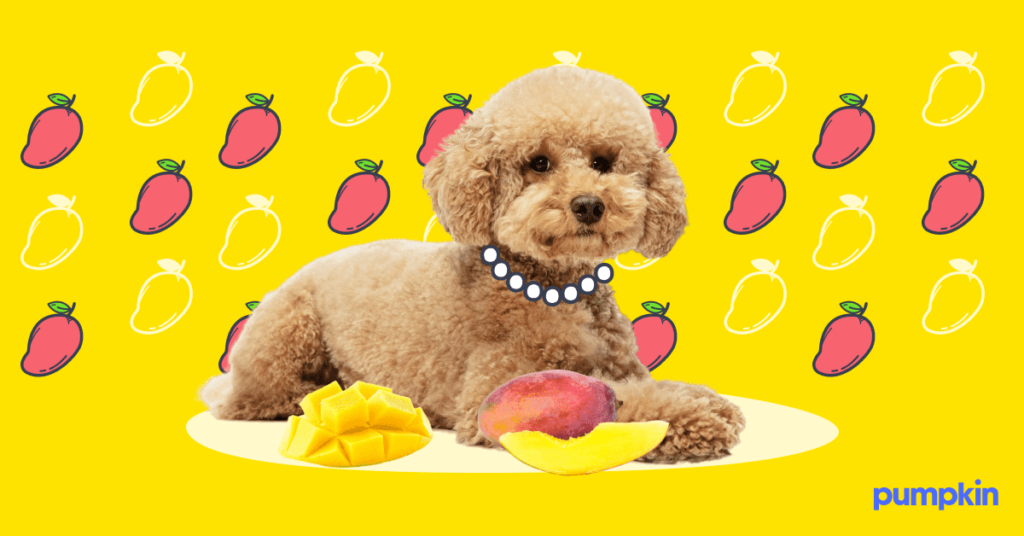- Lynn Guthrie
- Oct 14, 2024
- 8 min read
Key Points:
Yes, dogs can eat mango, but the pit and skin should always be removed first.
Mangoes provide dogs with vitamins A, B6, C, and E, and fiber.
Too much mango can lead to diarrhea in dogs due to the high sugar and fiber content.
Your dog may love to eat mangoes as much as you do. Of course, dogs also love to eat a lot of things they shouldn’t. Anyone who's ever watched their dog hoover up sticks, chicken wings carelessly left on the sidewalk, or literally anything else they can find, knows exactly what we're talking about.
So, we know that dogs can, and most likely will, eat mangoes. But can they eat this fruit safely?
If your dog snatched up a piece of mango from off the kitchen floor, you can relax. The short answer: Yes, your dog can eat mango, but as with any treat, moderation is key. The 90/10 rule (treats should only make up 10% of your dog’s daily calories) is crucial, especially for mangoes, which have high sugar and fiber content.
In this guide, we'll explore the nutritional benefits of mangoes and explain why this tasty fruit could be a fantastic, albeit occasional, addition to your dog’s diet.
The benefits of mango for dogs
Mangoes are a member of the pistachio and cashew family (yes, really) and are known as “The King of Fruit.” They contain over 20 vitamins and minerals, as well as beneficial enzymes. Some nutritionists even call them “superfruits.”
Mangoes are also free from fat, sodium, and cholesterol. They’re packed with powerful antioxidants and light in calories, with a 3/4 cup of mango containing only 70 calories. That’s fine for humans, but it’s too many calories for most dogs, so keep that in mind before offering this fruit as a snack.
How much mango can you add to the dinner bowl? According to veterinarian Dr. Sarah Wooten, DVM, you can use these general guidelines when sharing mangoes with dogs:
Extra-small dogs: 1-2 bite-size pieces
Small dogs: 3-4 bite-size pieces
Medium dogs: 5-6 bite-size pieces
Large dogs: 7-8 bite-size pieces
Extra-large dogs: 9-10 bite-size pieces
The nutritional content of mango
The bulk of a dog’s diet should be nutritionally balanced dog food. As long as you stick to the 90/10 rule (as you should with all people foods), then giving your pup some fruits and veggies is safe. It’s actually a great way to amp up your training, boost your dog’s health, and strengthen your bond with them.
Mangoes, in particular, are healthy additions to your dog’s treat menu. Here’s why:
Potassium: This important mineral supports efficient heart, kidney, digestion, and muscle function.
Magnesium: This micro-mineral supports the metabolization of proteins and fatty acids. It also supports energy production and the role of ligament and bone maintenance.
Vitamin B6 (Pyridoxine): Supports red blood cell generation, nervous system function, hormone regulation, and immune response.
Folate (vitamin B9 or folic acid): This vitamin assists with DNA synthesis and red blood cell production.
Vitamin C: This powerful antioxidant searches out and destroys free-radical molecules that can damage cells. It also supports the immune system.
Vitamin A: This fat-soluble vitamin supports your dog’s immune response, bone growth, reproductive system, and healthy vision.
Vitamin E: This vitamin is beneficial for healthy skin and coat and offers benefits for dogs with dry or itchy skin and ear infections.
Antioxidants: Mangoes are rich in Beta-carotene, Alpha-carotene, and cryptoxanthin antioxidants that protect against free-radical cell damage and support good vision.
Dietary fiber: Fiber moves food through a dog’s digestive system and improves stool quality. It’s also believed to support sugar levels in the blood and add an extended feeling of fullness for overweight dogs.
Potential risks of feeding mango to dogs
We always suggest talking with your veterinarian before letting your dog eat new foods. Even mango can be harmful for your dog when it’s not prepared properly.
Here’s why a large serving of mango can be unhealthy for your pup:
Sugar: Mangoes have high sugar content. If given freely to your dog, you could risk tooth decay, obesity, or high blood sugar if your dog is diabetic.
Carbohydrates: Carbs turn into sugar in your dog’s body. Mangoes have 25 grams of sugar per fruit, making them too sugary for anything but an occasional snack for most dogs (especially diabetic dogs).
Mango pit: Mango is a stone fruit, and the pit or stone contains amygdalin. This substance turns into cyanide when chewed and ingested. It could give your dog a tummy ache or even poison them if they eat too much.
Fiber: Mango flesh has beneficial fiber that supports your dog’s immune system and digestive tract. However, too much fiber in a dog’s diet can cause constipation, diarrhea, gas, or an upset stomach.
Mango skin: The skin of the mango is thick and fibrous. Your dog’s digestive system can’t process it, risking an intestinal blockage or choking hazard. This is especially dangerous for small-breed dogs.
Urushiol: Mangoes are part of the same botanical family as poison ivy. The skin contains urushiol, anoil that irritates the skin. For this reason, it’s not wise to give your dog mango peel (and the same goes for you).
Pet parents should watch out for signs of potential urushiol contact:
Swelling of the lips, tongue, or face
Hives
Excessive drooling
Food allergies: Most healthy dogs can safely eat mangoes, but in rare cases, your dog may have an allergy to this fruit.
Pet Pro Tip: If you have a dog that is prone to ‘snacksidents’ – you should consider getting a dog insurance plan as soon as possible. It can help you afford the best care in the future by covering eligible vet bills for digestive illnesses, toxic ingestion, and more.
Risks of mangoes for overweight and diabetic dogs
If your dog has diabetes or is overweight, take care when offering this fruit to them.
Overweight dogs don’t need an extra boost of sugar, and diabetic dogs risk blood sugar spikes from the mango’s high sugar content. In either of these cases, your veterinarian can advise you on the appropriate amount of mango for your dog’s diet — which may be zero.
Risks of mangoes for puppies

With their curious nature and often bottomless appetite, our puppies need special attention when it comes to their diet.
One of the potential risks of introducing mangoes to puppies is the fruit’s high fiber content. In this case, the adage “too much of a good thing” definitely applies. Puppies' bodies can't handle a lot of fiber. Too much, and they could suffer from diarrhea or an upset stomach.
Mangoes’ high sugar content is also problematic. Like in adult dogs, it can cause digestive issues in young pups.
How to prepare mango for your dog
When offering your pooch this healthy treat, remember one simple tip: moderation, moderation, moderation. And while we do understand how hard it can be to say no to your dog, we do recommend you curb the urge to give in. Your pup might not thank you, but their stomach will.
Fresh ripe mango
Only feed your dog ripe mango. When it’s ready, peel and cube or slice it into bite-sized pieces for a dog-safe treat. The mango flesh is soft and doesn’t present much of a choking hazard. Just make sure the pieces are size-appropriate for your pooch.
To give them to your dog, try throwing a cube or two into your dog’s daily kibble. This is also a great way to sneak in some extra hydration to your dog's diet. You can also blend the mango into a purée. You can serve this as a topper on your dog’s regular food or mix it with plain yogurt for a nutritious snack.
Dehydrated mango
Dehydrated mangoes make a quick, on-the-go, tasty treat for both you and your dog if you’re off for a day of activities. The water content isn’t present, but the nutrients will still benefit your pup.
Canned mango
In the canning process, mangoes lose some nutrients. You also risk additions of sugars, artificial flavors, or colorings. If canned mangoes have no additional ingredients other than 100% mango juice and water, they are safe for your dog. Double-check the label to make sure no extra ingredients are present.
Frozen mango
This is a wonderful way to serve mango on a hot summer day. The fruit still has hydration properties, nutritional benefits, and appeal to dogs. To prepare frozen mango for your dog, simply peel and remove the pit, then cut the flesh into spears or cubes. Place the mango pieces on a baking sheet or plate and freeze until solid.
For extra enrichment, you can also use frozen mango pieces in a puzzle toy.
Serve frozen mango as a teething aid for puppies

Mangoes are a great treat for one of the classic rites of passage for puppies — teething.
At three to four months, puppies often start gnawing on anything and everything to soothe their aching gums. While some owners buy teething treats, these are often made with unhealthy ingredients. Frozen mango is a good natural alternative you can use instead.
Plus, frozen mango chunks are super refreshing and sweet, which can also help distract your pups from chewing on the stuff you don’t want destroyed.
Alternatives to mango

While mangoes can be a tasty and nutritious treat for dogs, plenty of other fruits are just as safe and beneficial. Here are a few to consider:
Apples: A great source of fiber, vitamin C, and antioxidants. However, be sure to remove the core and seeds, as these can be a choking hazard.
Bananas: Rich in potassium, vitamin B6, and fiber. These are also easy to digest and can be a great source of energy for active dogs. However, like many fruits, they are high in natural sugars, so moderation is key.
Blueberries: Packed with antioxidants, fiber, and vitamins C and K. They are also low in calories and can help support a healthy immune system.
Strawberries: A good source of vitamin C, fiber, and antioxidants. They are also low-calorie and can be a refreshing treat for dogs, especially during the summer months.
Watermelon: A hydrating fruit high in vitamins A, B6, and C. Like other fruits, it’s low in calories and can be a great treat for dogs on hot days. However, be sure to remove the seeds and rind, as they can be a choking hazard.
When looking at fruits to give your dog, keep in mind that mango has way more vitamin A, C, and fiber than many other fruits. However, it is also higher in natural sugars, which can be a concern for dogs with certain health conditions.
A final word on mangoes for dogs
Mango is a healthy snack for dogs that’s packed with vitamins, minerals, and antioxidants. But initially, it's important to ease them into eating this fruit and keep an eye on how they handle it before offering more.
Talk to your vet before changing your dog’s diet, especially if they have special needs or health conditions. Your vet can also advise you on serving size and frequency. If you want to make sure your pup is taken care of and not have to stress about pricey vet trips, pet insurance may be a great option. Pumpkin Pet Insurance plans can help you afford the best care by covering eligible vet bills for future accidents and illnesses.
FAQs
What’s the best way to prepare mango for my dog?
To prepare mango safely for your dog, remove the flesh from the peel and pit. Cut the flesh into small, bite-sized pieces to avoid choking. You can serve it fresh, frozen, dehydrated, or puréed, but moderation is key.
How much mango can I give my dog?
Mango should be given to dogs in moderation. Follow the 90/10 rule, where treats make up no more than 10% of your dog’s daily caloric intake. Too much mango can lead to digestive issues due to its high sugar and fiber content.
Are there any dogs that should avoid eating mango?
Dogs with diabetes, obesity, or those prone to digestive issues should avoid eating mango due to its high sugar content. If your dog has a history of pancreatitis, diabetes, or other health conditions, consult your vet before introducing mango to their diet. Likewise, monitor your pup for an upset stomach or allergic reaction when feeding them new fruits.
REFERENCES
https://www.aspca.org/pet-care/animal-poison-control/people-foods-avoid-feeding-your-pets
https://roguepetscience.com/blogs/dog-nutrition/can-dogs-eat-mango
https://www.scientificamerican.com/article/what-do-cashews-mangoes-and-poison-ivy-have-in-common/#:~:text=What%20is%20the%20difference%20between,and%20you%20guessed%20it%2C%20cashews.
https://www.foodnetwork.com/healthyeats/2017/07/are-mangoes-really-the-king-of-fruits

